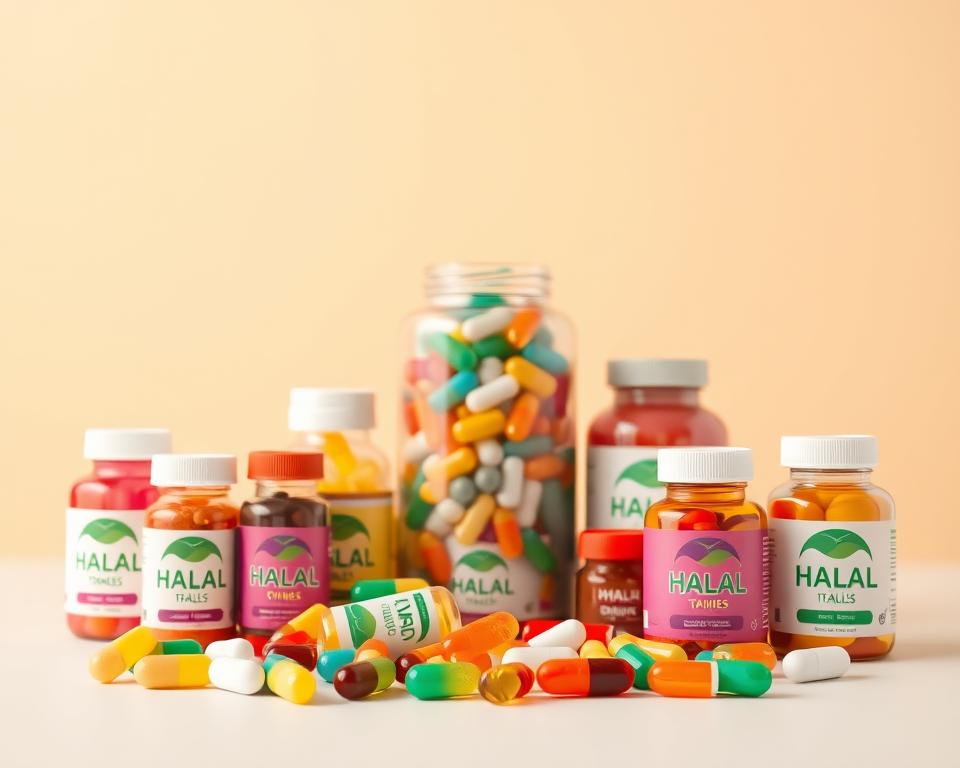A Guide to Halal Multivitamin Supplements and Why They Matter
Have you considered if the supplements you use are in harmony with your values and diet? The quest for halal multivitamin supplements has grown, driven by those seeking to adhere to Islamic dietary principles while maintaining health. Such a movement underscores a deepening focus on halal nutrition, blending health consciousness with honoring personal convictions. We will dive into the importance of halal health and why these halal multivitamin stand out as top choices.
Understanding Halal Supplements
Halal supplements cater to individuals observing Islamic diet regulations. Manufacturers rigorously audit these products to ensure they exclude any pork, alcohol, or non-halal animal components. The growing interest in health and wellness has boosted demand for halal nutrition. Modern consumers seek transparency regarding production methods and ingredient origins.
Halal wellness supplements stand out by adhering to ethical production methods. Suppliers are required to certify that their items contain no forbidden or harmful ingredients. Concentrating on ingredient purity elevates nutritional benefits and solidifies trust in halal-approved products.

Benefits of Halal Multivitamin Supplements
Going for reputable halal multivitamins yields major benefits for those balancing health goals with religious adherence. These vitamins not only fulfill Islamic dietary laws but also boost overall health. By offering crucial nutrients, they enhance energy and bolster the immune defenses.
The Muslim community’s expansion has increased the need for products that respect cultural and spiritual values. Beyond religious adherence, halal vitamins attract those seeking clean, ethically produced items. They are free from haram ingredients, appealing to vegetarians and health enthusiasts.
Selecting certified halal items guarantees transparent and honest production. This transparency fosters consumer confidence and demonstrates a commitment to health. Adding halal multivitamins to your daily routine can enhance your vitality and give you peace of mind.
Essential Components of Halal Multivitamins
Designed to supply necessary nutrients from halal-approved sources, these multivitamins ensure compliance. These vitamins contain components that encourage health without breaching dietary laws. Key components in these supplements are:
- Lichen-extracted vitamin D offers a plant-derived vegan source for vitamin D that meets halal standards.
- Beetroot-sourced iron, which offers a healthy and halal-certified source of this essential nutrient.
- Omega-3 sourced from algae oil, providing a vegan-friendly option that aligns with halal guidelines.
It’s essential to check that animal-derived ingredients, such as gelatin or whey, come from halal-approved sources. Verifying this confirms animals were slaughtered and handled per Islamic dietary laws. Choosing halal-certified vitamins endorses both ethical eating and comprehensive health.
Haram Ingredients You Should Avoid
Exploring halal dietary supplements requires a keen eye for haram ingredients. These ingredients compromise halal authenticity and dietary observance. It’s critical supplements align with both religious guidelines and individual values.
Pork-based gelatin is frequently used in capsules, making it haram. Those containing alcohol solvents or non-halal animal enzymes must be excluded. Ingredients such as magnesium stearate and glycerin may be haram if sourced improperly. Selecting plant-derived formulations sidesteps these potential issues.
Identifying haram elements is key to adhering faithfully to halal supplement guidelines. This knowledge empowers individuals to pick halal dietary supplements that fulfill their health needs without violating their beliefs.
How to Identify Certified Halal Vitamins
Scrutinizing packaging details helps ensure you pick authentic halal vitamins. Look for a clear halal seal, which indicates the product has been reviewed for compliance with halal standards. This seal is a reliable marker of halal health.
Additionally, analyzing the ingredient list is essential. Verify that any animal-based ingredients are sourced from halal-certified suppliers. Pay special attention to gelatin, as it could be non-halal if improperly sourced. Ensuring every ingredient’s halal compliance is essential for a prudent decision.
Talking directly to the manufacturers can also offer clarity. Manufacturers can detail how their products undergo halal vetting and auditing. This can boost your confidence in the product you choose. By following these steps, you can ensure the certified halal vitamins you select meet your dietary requirements.
Gummy Vitamins and Halal Compliance
Chewable gummy vitamins are increasingly popular with children and grown-ups alike, adding a flavorful twist to nutrition. However, the challenge lies in confirming they’re halal, since standard gummy recipes often include gelatin from pork.
Several brands now offer halal gummy vitamins, using vegetarian alternatives like pectin or carrageenan. Such plant-based binders allow consumers to indulge in gummies while staying true to their dietary laws. Be diligent in confirming ingredients and certification marks to select genuinely halal gummy vitamins.
Picking the right halal vitamins enhances well-being while honoring dietary convictions.
| Brand | Type | Halal Compliance | Key Ingredients |
|---|---|---|---|
| SmartyPants | Gummy Multivitamins | Halal Certified | Pectin, Vitamin D, Omega-3 |
| NutraBlast | Gummy Immune Support | Halal Certified | Carrageenan, Vitamin C, Zinc |
| MaryRuth Organics | Gummy Probiotics | Halal Certified | Pectin, Probiotic Blend |
Halal-Friendly Protein Powder Choices
If you’re committed to fitness, incorporating halal protein powder can be highly beneficial. Whether it’s whey or plant-based, halal protein powders provide the amino acids needed for muscle health. Always verify that no forbidden ingredients have found their way into the protein formula.
In reaction to market needs, numerous companies now supply halal-certified options with clear sourcing. By doing so, companies accommodate individuals desiring both performance and halal compliance. Choosing these powders aligns with halal dietary tenets while promoting physical health.
| Brand | Type of Protein | Certification |
|---|---|---|
| Optimum Nutrition | Whey Protein Isolate | Halal Certified |
| Orgain | Plant-Based Protein | Halal Certified |
| Muscle Milk | Protein Powder Blend | Halal Certified |
Including these powders in your diet helps you achieve fitness aims without deviating from halal observance.
Immune-Boosting Halal Multivitamins
In periods of heightened health concerns, halal supplements can bolster immunity. The blends contain essential nutrients like A, C, D, and zinc. These nutrients are key for a strong immune system, all while following halal dietary rules. A diverse selection of top halal-certified products is available to meet immune support demands.
An increasing assortment of halal-approved products is now on the market. Their design focuses on promoting wellness without violating halal standards. They deliver critical vitamins and minerals to fortify immune defenses. Integrating halal multivitamins into daily life facilitates better health aligned with your faith.
To Conclude
The role of halal multivitamins in health and wellness is rapidly growing. They resonate with individuals prioritizing both dietary values and nutritional quality. As halal-certified options multiply, consumers can balance health aspirations with spiritual convictions. This opens a path to better halal wellness.
Being familiar with certification steps and scrutinizing packaging is vital. This knowledge empowers consumers to choose the right halal supplements. Such diligence not only enhances well-being but also upholds spiritual devotion.
With the halal supplement market growing, consumers can merge ethical values with health goals. Choosing halal multivitamins can lead to a balanced health approach. It respects personal beliefs and lifestyle choices.

